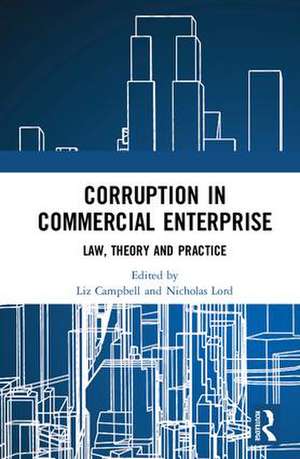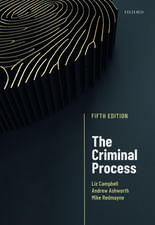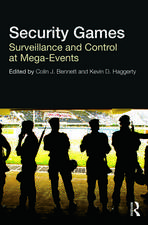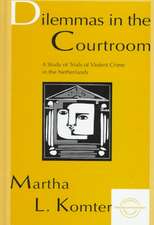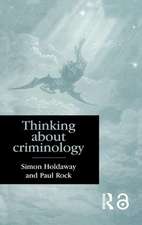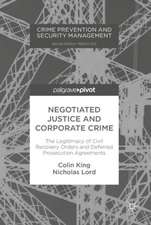Corruption in Commercial Enterprise: Law, Theory and Practice
Editat de Liz Campbell, Nicholas Lorden Limba Engleză Hardback – 20 apr 2018
There is nothing novel about bribes in brown envelopes and dubious backroom deals, ostensibly to grease the wheels of business. Corrupt practices like these go to the very heart of illicit transacting in both legal markets – such as kickbacks to facilitate contracts in international commerce – and illegal markets – such as payoffs to public officials to turn a blind eye to cross-border smuggling. Aside from the apparent pervasiveness and longevity of corruption in commercial enterprise, there is now renewed policy and operational attention on the phenomenon, prompting and meriting deeper analysis.
Corruption in commercial enterprise, encompassing behaviours often associated with corporate and white-collar crime, and corruption in criminal commercial enterprise, where we see corruption central to organised crime activities, are major public policy issues. This collection gives us insight into their nature, organisation and governance, and how to respond most appropriately and effectively.
| Toate formatele și edițiile | Preț | Express |
|---|---|---|
| Paperback (1) | 389.66 lei 6-8 săpt. | |
| Taylor & Francis – 11 noi 2019 | 389.66 lei 6-8 săpt. | |
| Hardback (1) | 1005.01 lei 6-8 săpt. | |
| Taylor & Francis – 20 apr 2018 | 1005.01 lei 6-8 săpt. |
Preț: 1005.01 lei
Preț vechi: 1225.61 lei
-18% Nou
Puncte Express: 1508
Preț estimativ în valută:
192.31€ • 209.55$ • 162.05£
192.31€ • 209.55$ • 162.05£
Carte tipărită la comandă
Livrare economică 23 aprilie-07 mai
Preluare comenzi: 021 569.72.76
Specificații
ISBN-13: 9781138063341
ISBN-10: 1138063347
Pagini: 306
Ilustrații: 12
Dimensiuni: 156 x 234 x 23 mm
Greutate: 0.59 kg
Ediția:1
Editura: Taylor & Francis
Colecția Routledge
Locul publicării:Oxford, United Kingdom
ISBN-10: 1138063347
Pagini: 306
Ilustrații: 12
Dimensiuni: 156 x 234 x 23 mm
Greutate: 0.59 kg
Ediția:1
Editura: Taylor & Francis
Colecția Routledge
Locul publicării:Oxford, United Kingdom
Public țintă
PostgraduateCuprins
Introduction: Liz Campbell and Nicholas Lord, "Corruption in commercial enterprise: an introduction"; 1: Mark Findlay, "Corruption as business across market contexts"; 2. Jay S. Albanese, "When corruption and organised crime overlap: an empirical hierarchy of corrupt conduct"; 3. Kenneth Murray, "Unfair advantage: the corruptive influence of criminal money on legitimate markets"; 4. Rose Broad and Nicholas Lord, "Corruption as a facilitator of human trafficking: some key analytical issues"; 5. Liz Campbell, "The organisation of corruption in commercial enterprise: concealing (and revealing) the beneficial ownership of assets"; 6. David Bamaung and John Cuddihy, "Corruption: the exposure and exploitation of human vulnerabilities"; 7. Adriaan Denkers, "Mickey-Mouse-money and gingerbread cookies: bonuses and organizational measures as predictors of corruption in organizations"; 8. Anna Markovska and Petrus C. van Duyne, "Contextualising corporate criminality in different cultural settings: the case of the gas industry in Ukraine"; 9. Aleksandra Jordanoska, "The dark side of finance: policing corruption through regulatory means"; 10. Liliya Gelemerova, Jackie Harvey and Petrus C. van Duyne, "Banks assessing corruption risk: a risky undertaking" ; 11. Calum Darling, "The duty to disclose: implications for corruption in commercial enterprise"; 12. Maurizio Bellacosa, "The fight against corruption in commercial enterprises: a comparative overview in light of the Italian experience"; 13. Nicholas Lord and Colin King, "Negotiating non-contention: civil recovery and deferred prosecution in response to transnational corporate bribery"; 14: Alan Doig, "Non-conviction financial sanctions, corporate anti-bribery reparation and their potential role in delivering effective anti-corruption pay-back: the emerging UK context"; 15. Index
Notă biografică
Liz Campbell is Professor of Criminal Law at Durham University. Her research is socio-legal, and currently is focused on responses to corruption, organised and organisational crime; and the presumption of innocence. She is interested in the interfaces between criminal law and regulation and between criminal and legal behaviour, and the politics of criminal law definitions. Her research has been funded by Research Council UK’s Partnership for Conflict, Crime and Security; Arts and Humanities Research Council; Law Foundation of New Zealand; Fulbright Commission; Modern Law Review; and Carnegie Trust.
Nicholas Lord is a Reader in Criminology at the University of Manchester. Nicholas has research expertise in white-collar, financial and organised crimes, and their regulation and control. He is currently undertaking funded research into the misuse of corporate vehicles in the concealment of illicit finances (PaCCS), the nature and governance of domestic bribery (British Academy), the counterfeit alcohols (Alcohol Research UK), the finances of modern slavery (N8) and to undertake a Global White-Collar Crime Survey (White & Case LLP). His book Regulating Corporate Bribery in International Business (2014, Routledge) was the winner of the British Society of Criminology Book Prize 2015.
Nicholas Lord is a Reader in Criminology at the University of Manchester. Nicholas has research expertise in white-collar, financial and organised crimes, and their regulation and control. He is currently undertaking funded research into the misuse of corporate vehicles in the concealment of illicit finances (PaCCS), the nature and governance of domestic bribery (British Academy), the counterfeit alcohols (Alcohol Research UK), the finances of modern slavery (N8) and to undertake a Global White-Collar Crime Survey (White & Case LLP). His book Regulating Corporate Bribery in International Business (2014, Routledge) was the winner of the British Society of Criminology Book Prize 2015.
Descriere
This collection focuses on the phenomenon of corruption in (non-)criminal commercial enterprise. It examines the interdependencies between organised crime and corruption in the context of criminal and non-criminal enterprise in domestic and international commerce in a range of OECD countries. The volume adopts a multi-disciplinary and jurisdictionally comparative approach, involving contributions from international academics and practitioners in the fields of law, criminology, sociology and political science.
